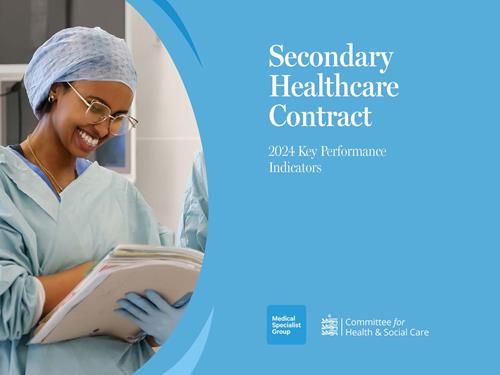
Latest Secondary Healthcare Contract KPI report shows more patients treated and improvements in waiting lists but ongoing challenges with some targets
Despite increasing numbers of islanders being referred for treatment, the total number on the waiting list and waiting times have improved in the past year, according to a report published today by Health & Social Care (HSC) and the Medical Specialist Group (MSG).
The 2024 Key Performance Indicators (KPIs) report for secondary healthcare shows that the inpatient waiting list fell by more than 20% from 2,799 at the end of 2023 to 2,207 at the end of 2024.
More than three out of five patients (62%) were seen by the MSG within the target time of eight weeks in 2024, a slight improvement on the 2023 figure of 61%. In all, four out of five routine patients (78%) were seen within three months of referral and almost all (93%) within six months.
2024 saw more inpatient admissions (total: 16,083), outpatient referrals (total: 22,605) and theatre procedures completed (total: 4,666) than the year before. An extra 287 patients were admitted to hospital, compared to 2023, with a total of 15,888 admissions. This highlights the increasing demand for care that HSC and the MSG must provide.
The KPIs report shows that despite the increasing numbers of patients treated, important quality indicators such as length of stay, unplanned returns to theatre and emergency readmissions outperformed the set targets.
Waiting times for radiology are also above target with 95% of patients getting an x-ray or scan within six weeks of referral, and a report on that scan delivered within eight weeks of referral.
The specialities with the longest waiting lists continue to be gastroenterology and orthopaedics (458 and 820 patients respectively, as of 1 January 2025). De Havilland Ward is having a positive impact with 488 orthopaedic procedures carried out on patients admitted to the dedicated orthopaedics ward, up from 462 in 2023.
Delayed transfers of care days, which measure the time that patients stay in hospital after they are considered fit for discharge, either because a nursing or care home bed is not available or because they need extra care at home, was at 338 days against a target of 100.
This equates to 12 beds in the PEH being consistently filled with patients who could have been discharged – the knock-on impact of which is an increase in surgery postponements and longer waiting times.
Dr Peter Rabey, HSC Medical Director, said:
“There are many positives that can be drawn from this latest KPIs report including the inpatient waiting list reducing by almost 600 across the year and a drop in patients waiting for general surgery from 483 to 275. The Emergency Department saw record numbers of admissions but continued to perform well and the number of hospital-acquired infections remains consistently low.
“We cannot control the rising demand for healthcare. We do not have infinite financial, staff, ward or theatre resources, but we have created additional capacity through our ophthalmology waiting list initiative and this has had a positive impact. We are also operating on more joints than ever before thanks to the dedicated orthopaedic beds available at De Havilland ward.
“The reality is our capacity in this field cannot be increased further until Phase 2 of Our Hospital Modernisation is completed that will offer increased theatre space. Waiting lists for gastroenterology and orthopaedics remain the highest out of all the specialities but in the climate of ever-increasing demand, maintaining waiting lists at a stable level should arguably be seen as a success.
“We recognise the impact of any delay for patients and their families who are waiting for surgery or are anxious to know the next steps for their diagnosis and treatment.
“Delayed transfers of care have been an issue for several years and are on the rise. There is pressure for long-term care across all care sectors and it is not unique to Guernsey – it is reflected at a national level too. Our ageing demographic means demand for long-term care will significantly increase in the coming decades. This is a pressing issue that illustrates why investment in health and social care must continue. Our Hospital Modernisation is crucial in supporting plans to meet the increasing long-term care needs of islanders.”
Dr Steve Evans, MSG Chair, said:
“We welcome the publication of the KPIs report. We are very happy to be held accountable for how we work in partnership with the HSC to deliver high quality secondary healthcare to islanders.
“I’d like to pay tribute to all our consultants and support team members and to our colleagues at the HSC for their hard work, commitment to clinical excellence and for the way they put our patients first, always.
“None of us want to see our patients waiting longer than they should and we are determined to continue to do all we can with HSC to continue to reduce waiting times.
“While we continue to increase the number of patients we care for, there has been no adverse impact on the standards of care. The average length of stay for a patient is just three days (against a target of less than six days) yet our emergency readmission rate is as low as 7% (against a target of less than 10%) which means that we are not discharging patients before they are ready to go home.
“Recruiting specialists with the right experience and approach to patient care continues to be a top priority. Last year we successfully recruited three ophthalmologists, one of whom started work in February. We’ve also just managed to recruit a fourth surgeon after a three-year gap since the previous post-holder left which we have had to fill with locums.”
The report can be found here.
Publishing of KPIs is a requirement of the Secondary Healthcare Contract which began in 2018. For the first time, the latest report includes an appendix showing trend data from 2018.
